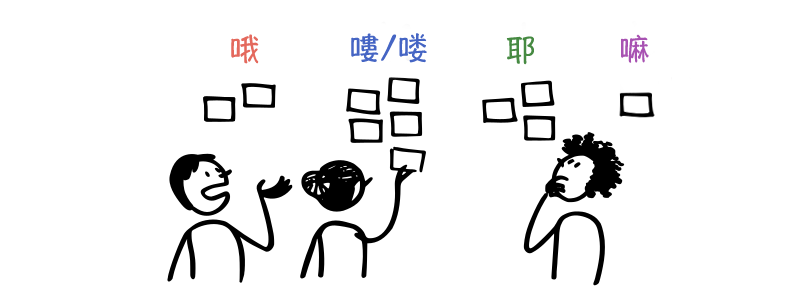Final Particles in Mandarin Chinese are a nightmare for most Chinese learners. In this article, we are going to learn喔 o, 喽 lou, 耶 ye and 嘛 ma.
Just in case, I provide audio files to help you know how we change intonations without changing any tones. Please make sure you’ve read the entire article before you listen to the file.
喔 o which can also be written as 哦 o
To express a wish, warning, or reminder
路上小心哦!路上小心哦!
Stay safe! (warning)
加油喔!加油喔!
Good luck! (wish)
我明天很忙哦!我明天很忙哦!
I will be busy tomorrow! (reminder)
Same as 啊 a to express the tone of excitement, surprise or enthusiasm, etc.
(Usually positive)
好哦!好哦!
OK! (excitement)
好可愛哦!好可爱哦!
So cute! (enthusiasm)
嘍/喽 lou which can also be written as 囉/啰 luo
喽 lou is the combination of new situation 了(le) and 哦 o
吃飯嘍!吃饭喽!
Dinner time!!
先睡囉!先睡啰!
I am going to bed now!
耶 ye which can also be written as 欸 ei
耶 ye is more girly, 欸 ei is more neutral.
To express sth. unexpected
下雨了耶!下雨了耶!
Uh! It’s raining now!
我好像胖了欸!我好像胖了欸!
Ah! I think I gained weight!
Same as 啊 a to express the tone of annoyance, complaining or silliness, etc.
(Usually negative)
你很煩耶!你很烦耶!
You are so annoying!
那個超貴欸!那个超贵欸!
That one is very expensive!!
To express certainty (but softer than 啊 a)
我不知道耶…我不知道耶…
I don’t know…
他家超有錢欸!!他家超有钱欸!!
His family is super rich!!
嘛 ma
To express sth. is obvious.
英文很難嘛~英文很难嘛~
English is hard~ (People know that)
我沒錢嘛~我没钱嘛~
I don’t have money~ (You know it)
To implore somebody to do something
給我一點錢嘛给我一点钱嘛
Give me some money, please~~~~
不要走嘛不要走嘛
Don’t leave (stay here), please~~
See some examples
Practice
For Advance learners
Do you know the difference?
好啊!好啊! (excited or certainty)
好喔!好喔! (excited)
好嘛!好嘛! (begging sb to do sth)
好啦!好啦! (to request sb. to do sth. in a soft way, not command)
好哇!好哇! (same as 好啊!好啊!)
好耶!好耶! (certainty, but softer than 啊)
好吧!好吧! (compromise)
好嘍!好喽! (excited; It used to be not ok, but now it’s ok)
So….好嗎?好吗? (Question that you really don’t know the answer)
- Final particles 1: 吗 ma, 吧 ba, and 呢 ne (HSK 1)
- Final particles 2: 啊 a, 呀 ya, 哇 wa, 哪 na, and 啦 la (HSK 2)


